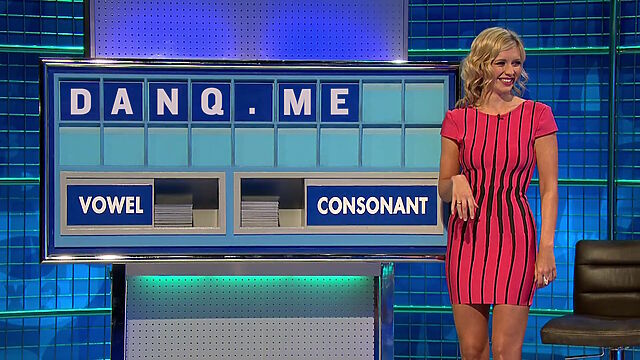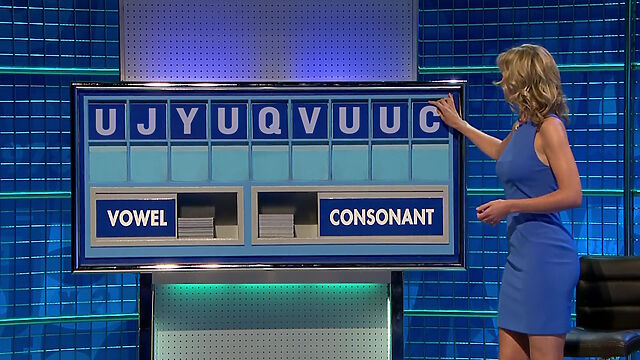Or: Sometimes You Don’t Need a Computer, Just a Brain
I was watching an episode of 8 Out Of 10 Cats Does Countdown the other night1 and I was wondering: what’s the hardest hand you can be dealt in a Countdown letters game?

Sometimes it’s possible to get fixated on a particular way of solving a problem, without having yet fully thought-through it. That’s what happened to me, because the first thing I did was start to write a computer program to solve this question. The program, I figured, would permute through all of the legitimate permutations of letters that could be drawn in a game of Countdown, and determine how many words and of what length could be derived from them2. It’d repeat in this fashion, at any given point retaining the worst possible hands (both in terms of number of words and best possible score).
When the program completed (or, if I got bored of waiting, when I stopped it) it’d be showing the worst-found deals both in terms of lowest-scoring-best-word and fewest-possible-words. Easy.
Here’s how far I got with that program before I changed techniques. Maybe you’ll see why:
#!/usr/bin/env ruby WORDLIST = File.readlines('dictionary.txt').map(&:strip) # https://github.com/jes/cntdn/blob/master/dictionary LETTER_FREQUENCIES = { # http://www.thecountdownpage.com/letters.htm vowels: { A: 15, E: 21, I: 13, O: 13, U: 5, }, consonants: { B: 2, C: 3, D: 6, F: 2, G: 3, H: 2, J: 1, K: 1, L: 5, M: 4, N: 8, P: 4, Q: 1, R: 9, S: 9, T: 9, V: 1, W: 1, X: 1, Y: 1, Z: 1, } } ALLOWED_HANDS = [ # https://wiki.apterous.org/Letters_game { vowels: 3, consonants: 6 }, { vowels: 4, consonants: 5 }, { vowels: 5, consonants: 4 }, ]
At this point in writing out some constants I’d need to define the rules, my brain was already racing ahead to find optimisations.
For example: given that you must choose at least four cards from the consonants deck, you’re allowed no more than five vowels… but no individual vowel appears in the vowel deck fewer than five times, so my program actually had free-choice of the vowels.
Knowing that3, I figured that there must exist Countdown deals that contain no valid words, and that finding one of those would be easier than writing a program to permute through all viable options. My head’s full of useful heuristics about English words, after all, which leads to rules like:
- None of the vowels can be I or A, because they’re words in their own right.
- Five letter Us is a strong starting point, because it’s very rarely used in two-letter words (and this set of tiles is likely to be hard enough that three-letter words are already an impossibility).
- This eliminates the consonants M (mu, um: the Greek letter and the “I’m thinking” sound), N (nu, un-: the Greek letter and the inverting prefix), H (uh: another sound for when you’re thinking or hesitating), P (up: the direction of ascension), R (ur-: the prefix for “original”), S (us: the first-person-plural pronoun), and X (xu: the unit of currency). So as long as we can find four consonants within the allowable deck letter frequency that aren’t those five… we’re sorted.

I enjoyed getting “Q” into my proposed letter set. I like to image a competitor, having already drawn two “U”s, a “J”, and a Y”, being briefly happy to draw a “Q” and already thinking about all those “QU-” words that they’re excited to be able to use… before discovering that there aren’t any of them and, indeed, aren’t actually any words at all.
Even up to the last letter they were probably hoping for some consonant that could make it work. A K (juku), maybe?
But the moral of the story is: you don’t always have to use a computer. Sometimes all you need is a brain and a few minutes while you eat your breakfast on a slow Sunday morning, and that’s plenty sufficient.
Update: As soon as I published this, I spotted my mistake. A “yuzu” is a kind of East Asian plum, but it didn’t show up in this countdown solver! So my impossible deal isn’t quite so impossible after all. Perhaps U J Y U Q V U U C would be a better “impossible” set of tiles, where that “C” makes it briefly look like there might be a word in there, even if it’s just a three or four-letter one… but there isn’t. Or is there…?
Footnotes
1 It boggles my mind to realise that show’s managed 28 seasons, now. Sure, I know that Countdown has managed something approaching 9,000 episodes by now, but Cats Does Countdown was always supposed to be a silly one-off, not a show in it’s own right. Anyway: it’s somehow better than both 8 Out Of 10 Cats and Countdown, and if you disagree then we can take this outside.
2 Herein lay my first challenge, because it turns out that the letter frequencies and even the rules of Countdown have changed on several occasions, and short of starting a conversation on what might be the world’s nerdiest surviving phpBB installation I couldn’t necessarily determine a completely up-to-date ruleset.
3 And having, y’know, a modest knowledge of the English language

You’ve got me wondering what the chances are of an impossible deal now…
Look at you, trying to nerdsnipe me with a question as if it weren’t one I’d already thought of myself. 😅
We might be able to conservatively estimate it by cutting out swathes of permutations that contain any valid word. You have to have at least 3 vowels, but if any are an A or an I then you’ve instantly got a word. So if you ask Rachel for “three vowels, please” – the absolute minimum allowed – then there’s only a (39/67)×(38/66)×(37/65) chance that you don’t get a one-letter word for free. That’s about 19%. And of course you’ve still got six letters left to choose.
If you’ve been unfortunate enough to get some Es you’re in trouble now. The chance of avoiding all of the words like BE, FEE, GEE, LEE, ME, EKE, NEE, PEE, RE, ERE, SEE, TE, VEE, WEE, YE, EX etc. (I don’t know if Scots “ee” is a permitted word) makes the odds of getting no words instantly… perhaps infinitesimally small, so we can probably ignore all tilesets that include an E. Also, if you have both an O and a U then you can spell ou, which is a species of bird. Also, oo is an acceptable alternative spelling of “ooh”, so having 2+ O tiles guarantees a word as well.
Therefore, the only sets that have no words are likely to be ones where the only vowels are U; i.e. those with 3, 4, or 5 Us and no usable consonants. So when you say “three vowels, please” to Rachel, she needs to pull three consecutive letter Us. That’s a 0.2% chance already, and it’s only going to get smaller from there. If we assume the ruleset has always been the same (it hasn’t; long ago contestants could say “all consonants” if they liked, which could in some circumstances be strategic if e.g. they already had a lead on their opponent and/or were stronger at the numbers round, in order to spoil the round… though I’m not convinced it’s ever happened!), the chance of three Us turning up in a single letters game is sufficiently low that we’d only ever have expected it to happen twice in the entire history of Countdown, even if we include Cats Does Countdown as a spinoff.
And of course, having happened, there still need to be six more tiles. If the contestant opts for a fourth or fifth vowel they really increase their odds of finding a word: drawing an A, I, or O from the depleted deck instantly gives them a word, and there’s a 64% chance of that with any draw, so a contestant who really doesn’t want anybody to find any words should, having already hit the jackpot by getting three Us right out of the gate, switch to consonants. MU, NU, WU, UP, US, and ULU are a risk, and you’ve got a 42% chance of hitting one of them with your very next tile: lower than if you opted for a vowel, though, so worth a shot.
So that give you an optimal way of choosing your first-four-letters and we’re talking about a probability of only around 0.000087% that you haven’t found a word already. That’s low enough that, even if every contestant in every 15-round game of Countdown that’s ever been broadcast played this way – trying to work towards the worst possible state and getting the vowels out of the way first – for its entire ~9,000 episode run… we’d still only expect there to have been about 6 times ever that the first four letters didn’t contain any words.
Now we need to start estimating:
Each subsequent letter drawn increases the chance that a word is found. The most-common remaining consonant that doesn’t give you a word, at this point, is R… but if you draw an R then you lock yourself out of being able to “safely” draw a B (RUB, BUR), D (RUD), F (FUR), G (RUG), and T (RUT), in addition to the already-forbidden very-common letters M, N, P, S, and L and the less-common W. So drawing an R probably leaves you with a word down-the-line. Similar logic applies to D, F, G, T, and H, among others. So you’re trying to draw consonants and, let’s optimistically say, they can only be B, C, J, K, Q, V, Y and Z: a little under 15% of the remaining consonants deck is in the “safer” category.
That’s not to say that every combination outside of these will inevitably contain a word, nor that every combination containing only these letters will not: but we’re looking for a way to estimate the odds using estimation alone.
So it looks like with optimal play (from a “make the game impossible” perspective), having drawn three Us (0.2%), it to then request six consonants. The odds of those six consonants giving you no valid words at all looks to be about 0.00001%. So the chance of achieving all of the above comes from multiplying the two together for a grand total of… 0.00000000225%. That’s what I reckon the approximate odds are of getting a set of tiles in which there are no words, assuming that you play an optimal selection strategy to try to aim for that goal. If you play about 300,000,000 letter games and try to “spoil” it this way every single time, you begin to get to the point that it’s more-likely-than-not than you’ve managed it.
If every player on the show starts playing every letters game this way from now on, we’ve got a 50% chance of getting a “spoiled” game by around the year 2045. What are we waiting for!
tl;dr: if you want to try to make an unwinnable game happen and play an optimal strategy for that goal (three vowels, six consonants), you’ve got maybe a one-in-half-a-trillion chance of making it happen.
For what it’s worth, CUY is a South American word for guinea pig – especially in a culinary context – which I expect will make its way into English dictionaries in due course …
Ooh, right you are! I couldn’t find it in any of the ones I tried, but it’s made it into Wiktionary already where it’s observed that it comes via Peruvian Spanish which in turn took it from the Quechuan word for the animal, quyi!